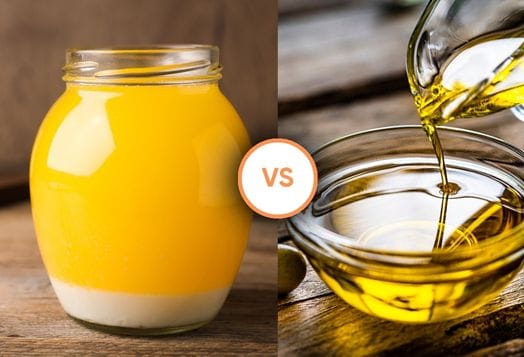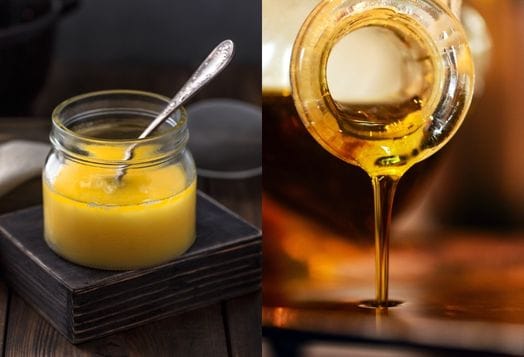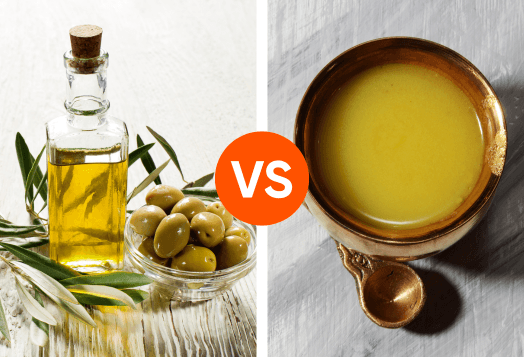
Once upon a time, ghee was the go-to choice for cooking in kitchens in India. Then, regular cooking oils took over. With convenience and affordability on its side, cooking oil quickly became a favourite in the Indian kitchen. People didn’t have to spend the entire day making batches of ghee at home with oil in the picture. But over time, issues like unhealthy fats and smoke points made everyone question if ghee is healthier than oil and if the switch was worth it.
Is Ghee Better Than Cooking Oil?
Ghee, with its ancient roots and nutritional benefits, stands out as more than just a cooking medium. While oils bring convenience, they often come with drawbacks like unhealthy trans fats and health issues. Could ghee be the healthier, better option? Let’s dive into the reasons why ghee might just be the better choice for your kitchen and health.
1. A punch of vitamins
Packed with fat-soluble vitamins A, D, E, and K, ghee delivers essential nutrients that support a healthy immune system, promote bone strength, and keep your skin glowing. These vitamins are crucial for various bodily functions, and ghee ensures you’re getting them with every meal. Unlike regular oils, ghee provides a natural and nourishing boost to your overall health.
2. High smoke point, high quality
When cooking, one major noticeable difference between ghee and cooking oil is ghee’s impressively high smoke point of 252°C (485°F). This means ghee remains stable at higher temperatures without breaking down into harmful free radicals (the unstable molecules that can cause damage to your cells and increase the risk of disease). Many cooking oils break down at high heat, but ghee keeps your meals safe and nutritious, even when cooked at high temperatures.

Ghee is a jack of all trades when it comes to health, as it is packed with antioxidants that help cleanse the body, potentially reducing the risk of chronic diseases. Its butyric acid content also supports digestion, acting as a natural laxative and promoting gut health. Ghee might be high in saturated fats, but it also contains conjugated linoleic acid (CLA), which may help improve insulin sensitivity and support heart health when consumed in moderation. All in all, ghee offers a powerful blend of benefits for your overall well-being.
4. A taste upgrade you’ll love
When it comes to ghee vs cooking oil, ghee is a bomb of flavour. With its rich, nutty notes, it turns ordinary dishes into something unforgettable. Unlike bland, neutral oils, ghee brings a bold, buttery taste that makes every bite a little more exciting. Use it in your curry or drizzle it over your roasted vegetable; ghee is going to win your heart and even take care of it, unlike oils.
5. How It’s Made Matters
When it comes to whether ghee is healthier than oil, their production methods can give you some clarity. Cooking oils are either refined or unrefined. Refined oils are produced using machines and chemicals at high temperatures, stripping away nutrients. On the other hand, unrefined oils are made using traditional wood presses, retaining a richer taste, aroma, and nutrients.
While ghee is crafted differently, it’s made from curd, milk cream, or store-bought butter. High-quality A2 ghee is churned from curd to make butter and then heated slowly to separate the ghee from milk solids. This method keeps its flavour, aroma, and nutrient density, making it a standout choice for your kitchen.
Is Ghee Healthier Than Oil?

Yes, ghee is healthier than oil as it brings a range of benefits that cooking oils often lack, such as being packed with essential nutrients and powerful antioxidants to support digestion and heart health. Its high smoke point and rich flavour are just the icing on the cake. Now you know why ghee is better than oil, so the next time you’re cooking, consider making the switch to ghee.
Disclaimer: This information provided is intended for general informational purposes only. It is not a substitute for professional advice or guidance. For personalised recommendations or specific concerns, please consult a certified professional.




